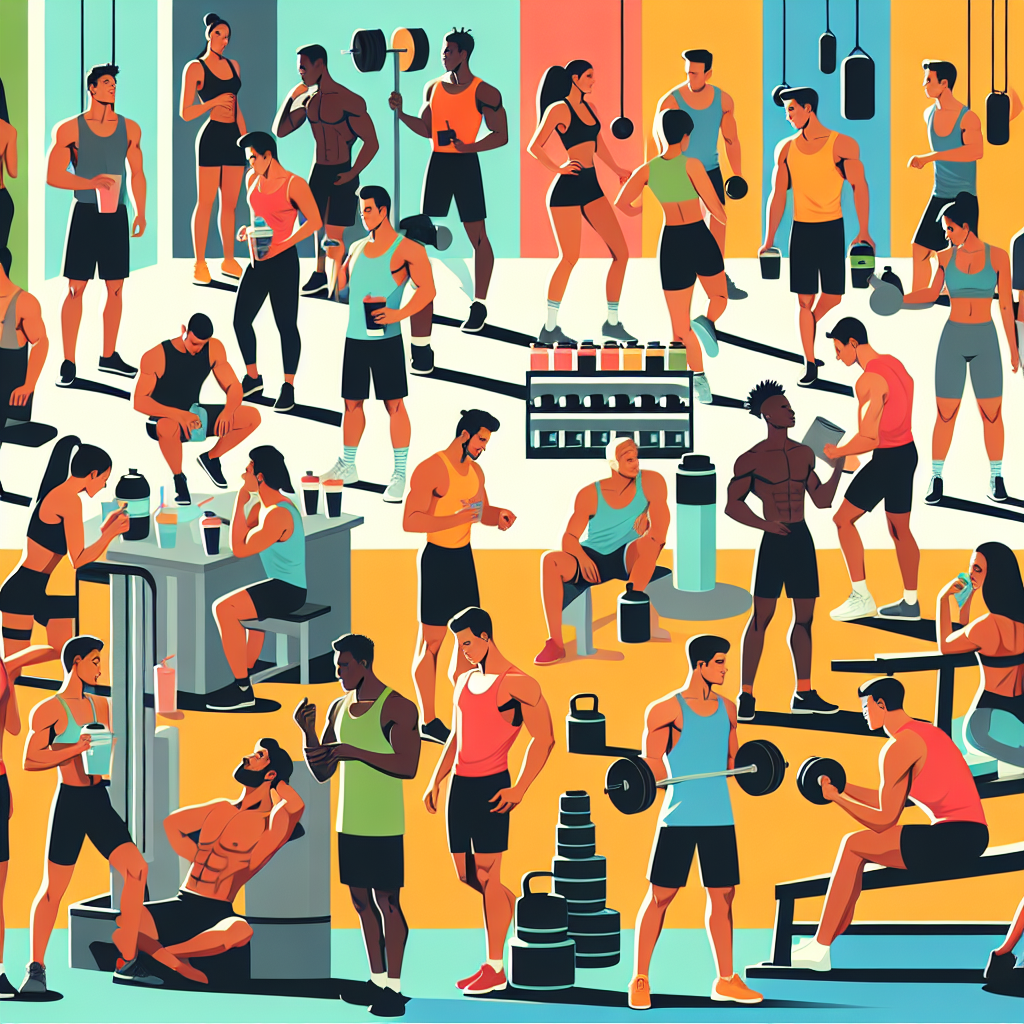Recent studies show that many teenagers and young adults are using protein shakes, pre-workout mixes, and other dietary supplements, which may be connected to a body image issue called muscle dysmorphia. This condition makes people overly focused on building muscle and being lean. Dr. Kyle Ganson, who led the study and works at the University of Toronto, points out that using supplements like whey protein and creatine can increase the symptoms of muscle dysmorphia.
The research, published in the journal PLOS Mental Health, looked at data from 2,731 people aged 16 to 30. It focused on their use of supplements and signs of muscle dysmorphia. The results showed a strong link between taking weight-gain supplements and more severe symptoms, like spending too much time at the gym and obsessively tracking what they eat. However, since the study is observational, it’s hard to say if using supplements causes muscle dysmorphia or if people with this disorder are more likely to use them.
Muscle dysmorphia is a type of body dysmorphic disorder where people feel their bodies are not good enough, often thinking they need to be leaner and more muscular. Dr. Ganson explains that those with this disorder can face serious social problems and emotional pain. Even if they reach their ideal body, they may still feel unhappy because they see themselves differently than others do. Signs of muscle dysmorphia include strict workout routines, emotional struggles, and avoiding social situations because of body image worries.
Many young adult males use supplements to change their appearance, but a lot of these products are not well regulated, which can be risky for health. Dr. Jason Nagata, a co-author of the study, warns that some supplements might be mislabeled or contain harmful substances. Additionally, using legal muscle-building supplements can sometimes lead to the use of anabolic steroids, which can be very dangerous. To help those with muscle dysmorphia, it’s important to challenge the unrealistic body ideals often seen on social media. Treatment options like cognitive behavioral therapy can help people change how they see themselves, and support from families, healthcare professionals, and coaches is essential.
Original news source: Muscle-building supplements may put teens at risk for a body image disorder, study finds (CNN)
🎧 Listen:
Slow
Normal
Fast
📖 Vocabulary:
| 1 | supplements | Products taken to add nutrients to your diet |
| 2 | dysmorphia | A condition where someone sees their body differently than it is |
| 3 | whey | A type of protein often used in fitness products |
| 4 | creatine | A substance that helps supply energy to muscles |
| 5 | observational | Based on watching and recording information without changing anything |
| 6 | disorder | A mental or physical condition that is not normal |
| 7 | regulated | Controlled by rules or laws |
| 8 | mislabeled | Incorrectly named or described |
| 9 | anabolic | Related to building up or growing |
| 10 | steroids | Chemicals that can make muscles grow faster |
| 11 | cognitive | Related to thinking and understanding |
| 12 | behavioral | Related to actions and how people behave |
| 13 | therapy | Treatment to help someone feel better |
| 14 | unrealistic | Not real or not possible |
| 15 | ideals | Standards or models of perfection |
Group or Classroom Activities
Warm-up Activities:
– CHARADES
Instructions: Students will act out various terms related to the article (e.g., “protein shakes,” “muscle dysmorphia,” “gym,” “dietary supplements”) without speaking, while their classmates guess the terms. This will help them engage with the vocabulary in a fun way.
– NEWS REPORTER ROLE-PLAY
Instructions: In pairs, students will role-play as news reporters presenting a summary of the article. One will act as the reporter, and the other as an expert interviewee. They should include key points such as the findings of the study and the implications of muscle dysmorphia.
– OPINION POLL
Instructions: Create a list of statements from the article related to body image and supplements (e.g., “Using protein shakes is necessary for muscle building”). Students will move around the room, asking classmates whether they agree or disagree, and tallying the results for a class discussion.
– MINDS MAP
Instructions: In groups, students will create a mind map based on the article. They will write “Muscle Dysmorphia” at the center and branch out with related concepts such as causes, symptoms, and treatment options. This will enhance their comprehension and retention of the material.
– PASS THE STORY
Instructions: Students will sit in a circle. The first student starts by summarizing a part of the article, then the next student continues with another part, and so on. This activity encourages listening skills and helps reinforce the structure of the article while practicing speaking.
🤔 Comprehension Questions:
1. What is muscle dysmorphia, and how does it affect people’s perception of their bodies?
2. Who conducted the study on muscle dysmorphia and where do they work?
3. What age group was involved in the research about supplements and muscle dysmorphia?
4. What were some of the symptoms linked to taking weight-gain supplements according to the study?
5. Why is it difficult to determine whether supplements cause muscle dysmorphia or if those with the disorder are more likely to use them?
6. How can muscle dysmorphia impact a person’s social life and emotional well-being?
7. What warning did Dr. Jason Nagata give about dietary supplements used by young adult males?
8. What treatment options are suggested for helping individuals with muscle dysmorphia?
Go to answers ⇩
🎧✍️ Listen and Fill in the Gaps:
Recent studies show that many teenagers and young adults are using protein shakes, pre-workout mixes, and (1)______ dietary (2)______, which may be connected to a body image issue called muscle dysmorphia. This condition makes people overly (3)______ on building muscle and being lean. Dr. Kyle Ganson, who led the study and works at the University of Toronto, points out that using supplements like whey protein and creatine can increase the symptoms of muscle dysmorphia.
The research, published in the journal PLOS Mental Health, (4)______ at data from 2,731 people aged 16 to 30. It focused on their use of supplements and (5)______ of muscle dysmorphia. The results showed a strong link between (6)______ weight-gain supplements and more severe symptoms, like spending too much time at the gym and obsessively tracking what they eat. However, since the study is observational, it’s hard to say if using supplements causes muscle dysmorphia or if (7)______ with this disorder are more likely to use them.
(8)______ dysmorphia is a type of body dysmorphic disorder where people feel their bodies are not good enough, often thinking they need to be leaner and more muscular. Dr. Ganson explains that those with this disorder can face serious social problems and emotional pain. Even if they reach their ideal body, they may still feel unhappy because they see themselves differently than others do. Signs of muscle (9)______ include (10)______ workout routines, emotional struggles, and (11)______ social (12)______ because of body image worries.
Many young adult males use supplements to change their appearance, but a lot of these products are not well regulated, which can be risky for health. Dr. Jason Nagata, a co-author of the study, warns that some supplements might be mislabeled or contain harmful substances. Additionally, using legal muscle-building supplements can sometimes lead to the use of (13)______ steroids, which can be very dangerous. To help those with muscle dysmorphia, it’s (14)______ to challenge the (15)______ body ideals often seen on social media. Treatment (16)______ like cognitive behavioral therapy can help people change how they see themselves, and support from families, healthcare professionals, and coaches is essential.
Go to answers ⇩
💬 Discussion Questions:
Students can ask a partner these questions, or discuss them as a group.
1. What is your opinion on the use of dietary supplements among teenagers?
2. How would you feel if someone close to you became obsessed with their body image?
3. Do you think social media influences how people view their bodies? Why or why not?
4. Have you ever felt pressured to look a certain way because of what you see online?
5. What is a healthy way to build muscle without using supplements?
6. How would you react if a friend started using protein shakes or other supplements?
7. Do you think muscle dysmorphia is a serious issue among young people today? Why?
8. What are some signs that someone might be struggling with their body image?
9. Do you like going to the gym? Why or why not?
10. How do you think society can change the way we view body image?
11. Have you ever tried any supplements or special diets? What was your experience like?
12. Do you think it’s important to talk about mental health issues like muscle dysmorphia? Why?
13. How would you feel if you reached your ideal body but still felt unhappy?
14. What is a positive way to support someone who is struggling with their body image?
15. Do you think schools should educate students about body image and health? Why or why not?
Individual Activities
📖💭 Vocabulary Meanings:
Match each word to its meaning.
Words:
1. supplements
2. dysmorphia
3. whey
4. creatine
5. observational
6. disorder
7. regulated
8. mislabeled
9. anabolic
10. steroids
11. cognitive
12. behavioral
13. therapy
14. unrealistic
15. ideals
Meanings:
(A) Controlled by rules or laws
(B) Standards or models of perfection
(C) Chemicals that can make muscles grow faster
(D) Related to thinking and understanding
(E) Related to building up or growing
(F) A condition where someone sees their body differently than it is
(G) A substance that helps supply energy to muscles
(H) Treatment to help someone feel better
(I) Not real or not possible
(J) Products taken to add nutrients to your diet
(K) A type of protein often used in fitness products
(L) Related to actions and how people behave
(M) A mental or physical condition that is not normal
(N) Incorrectly named or described
(O) Based on watching and recording information without changing anything
Go to answers ⇩
🔡 Multiple Choice Questions:
1. What condition is linked to the use of protein shakes and dietary supplements among young people?
(a) Anorexia
(b) Bulimia
(c) Muscle dysmorphia
(d) Obesity
2. Who led the study on muscle dysmorphia and dietary supplement use?
(a) Dr. Kyle Ganson
(b) Dr. Jason Nagata
(c) Dr. John Smith
(d) Dr. Emily White
3. What age group was the focus of the research on muscle dysmorphia?
(a) 16 to 30 years old
(b) 12 to 18 years old
(c) 20 to 35 years old
(d) 25 to 40 years old
4. What is a common sign of muscle dysmorphia?
(a) Excessive eating
(b) Lack of exercise
(c) Strict workout routines
(d) Frequent socializing
5. What type of therapy can help people with muscle dysmorphia change their self-perception?
(a) Physical therapy
(b) Cognitive behavioral therapy
(c) Occupational therapy
(d) Art therapy
6. What warning did Dr. Jason Nagata give regarding dietary supplements?
(a) They are always safe to use
(b) They are only effective for older adults
(c) They have no side effects
(d) They may be mislabeled or contain harmful substances
7. What can using legal muscle-building supplements sometimes lead to?
(a) Improved mental health
(b) The use of anabolic steroids
(c) Better social skills
(d) Increased flexibility
8. What is an important step in helping those with muscle dysmorphia?
(a) Ignoring their concerns
(b) Encouraging them to work out more
(c) Promoting extreme dieting methods
(d) Challenging unrealistic body ideals on social media
Go to answers ⇩
🕵️ True or False Questions:
1. Not many teenagers and young adults are using protein shakes and other dietary supplements.
2. Dr. Kyle Ganson led a study at the University of Toronto about muscle dysmorphia and supplement use.
3. Some supplements may be mislabeled or contain harmful substances, according to Dr. Jason Nagata.
4. Muscle dysmorphia is a condition where people are overly focused on being muscular and lean.
5. Many young adult males use supplements to improve their appearance, but these products can be risky for health.
6. Muscle dysmorphia usually doesn’t lead to emotional pain or social problems for those who have it.
7. The research found a weak connection between taking weight-gain supplements and severe muscle dysmorphia symptoms.
8. Treatment options like medication therapy can help people with muscle dysmorphia change their self-image.
Go to answers ⇩
📝 Write a Summary:
Write a summary of this news article in two sentences.
Check your writing now with the best free AI for English writing!
Writing Questions:
Answer the following questions. Write as much as you can for each answer.
Check your answers with our free English writing assistant!
1. What is muscle dysmorphia, and how does it affect young people’s body image?
2. According to the study, what are some signs that someone might have muscle dysmorphia?
3. Why is it difficult to determine if using supplements causes muscle dysmorphia?
4. What risks are associated with using dietary supplements, according to Dr. Jason Nagata?
5. How can treatment options like cognitive behavioral therapy help people with muscle dysmorphia?
✅ Answers
🤔✅ Comprehension Question Answers:
1. What is muscle dysmorphia, and how does it affect people’s perception of their bodies? Muscle dysmorphia is a type of body dysmorphic disorder where individuals feel their bodies are not good enough. They often think they need to be leaner and more muscular, leading to an unhealthy focus on their appearance.
2. Who conducted the study on muscle dysmorphia and where do they work? The study was conducted by Dr. Kyle Ganson, who works at the University of Toronto.
3. What age group was involved in the research about supplements and muscle dysmorphia? The research involved people aged 16 to 30.
4. What were some of the symptoms linked to taking weight-gain supplements according to the study? The study found that taking weight-gain supplements was linked to symptoms like spending too much time at the gym and obsessively tracking what they eat.
5. Why is it difficult to determine whether supplements cause muscle dysmorphia or if those with the disorder are more likely to use them? It’s difficult because the study is observational, meaning it can show a relationship but not prove that one causes the other.
6. How can muscle dysmorphia impact a person’s social life and emotional well-being? Muscle dysmorphia can lead to serious social problems and emotional pain, making individuals avoid social situations due to body image worries and causing them to feel unhappy even if they reach their ideal body.
7. What warning did Dr. Jason Nagata give about dietary supplements used by young adult males? Dr. Nagata warned that some supplements might be mislabeled or contain harmful substances, and using legal muscle-building supplements can sometimes lead to the use of dangerous anabolic steroids.
8. What treatment options are suggested for helping individuals with muscle dysmorphia? Suggested treatment options include cognitive behavioral therapy to help change how individuals see themselves, along with support from families, healthcare professionals, and coaches.
Go back to questions ⇧
🎧✍️✅ Listen and Fill in the Gaps Answers:
(1) other
(2) supplements
(3) focused
(4) looked
(5) signs
(6) taking
(7) people
(8) Muscle
(9) dysmorphia
(10) strict
(11) avoiding
(12) situations
(13) anabolic
(14) important
(15) unrealistic
(16) options
Go back to questions ⇧
📖💭✅ Vocabulary Meanings Answers:
1. supplements
Answer: (J) Products taken to add nutrients to your diet
2. dysmorphia
Answer: (F) A condition where someone sees their body differently than it is
3. whey
Answer: (K) A type of protein often used in fitness products
4. creatine
Answer: (G) A substance that helps supply energy to muscles
5. observational
Answer: (O) Based on watching and recording information without changing anything
6. disorder
Answer: (M) A mental or physical condition that is not normal
7. regulated
Answer: (A) Controlled by rules or laws
8. mislabeled
Answer: (N) Incorrectly named or described
9. anabolic
Answer: (E) Related to building up or growing
10. steroids
Answer: (C) Chemicals that can make muscles grow faster
11. cognitive
Answer: (D) Related to thinking and understanding
12. behavioral
Answer: (L) Related to actions and how people behave
13. therapy
Answer: (H) Treatment to help someone feel better
14. unrealistic
Answer: (I) Not real or not possible
15. ideals
Answer: (B) Standards or models of perfection
Go back to questions ⇧
🔡✅ Multiple Choice Answers:
1. What condition is linked to the use of protein shakes and dietary supplements among young people?
Answer: (c) Muscle dysmorphia
2. Who led the study on muscle dysmorphia and dietary supplement use?
Answer: (a) Dr. Kyle Ganson
3. What age group was the focus of the research on muscle dysmorphia?
Answer: (a) 16 to 30 years old
4. What is a common sign of muscle dysmorphia?
Answer: (c) Strict workout routines
5. What type of therapy can help people with muscle dysmorphia change their self-perception?
Answer: (b) Cognitive behavioral therapy
6. What warning did Dr. Jason Nagata give regarding dietary supplements?
Answer: (d) They may be mislabeled or contain harmful substances
7. What can using legal muscle-building supplements sometimes lead to?
Answer: (b) The use of anabolic steroids
8. What is an important step in helping those with muscle dysmorphia?
Answer: (d) Challenging unrealistic body ideals on social media
Go back to questions ⇧
🕵️✅ True or False Answers:
1. Not many teenagers and young adults are using protein shakes and other dietary supplements. (Answer: False)
2. Dr. Kyle Ganson led a study at the University of Toronto about muscle dysmorphia and supplement use. (Answer: True)
3. Some supplements may be mislabeled or contain harmful substances, according to Dr. Jason Nagata. (Answer: True)
4. Muscle dysmorphia is a condition where people are overly focused on being muscular and lean. (Answer: True)
5. Many young adult males use supplements to improve their appearance, but these products can be risky for health. (Answer: True)
6. Muscle dysmorphia usually doesn’t lead to emotional pain or social problems for those who have it. (Answer: False)
7. The research found a weak connection between taking weight-gain supplements and severe muscle dysmorphia symptoms. (Answer: False)
8. Treatment options like medication therapy can help people with muscle dysmorphia change their self-image. (Answer: False)
Go back to questions ⇧















